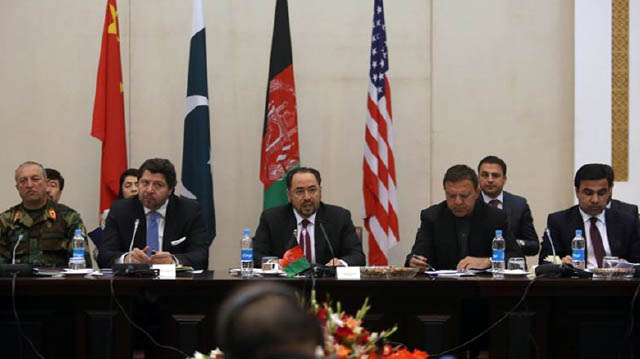The resumption of peace process between Afghanistan and the Taliban elements is hotly debated. The four-nation group, which is comprised of Pakistan, Afghanistan, China and the United States, seeks to bring warring factions to the negotiating table. The last meeting of Quadrilateral Coordination Group (QCG), which was held in Kabul on February 23, said that direct talks between the Afghan government and militants would be held in the first week of March in Pakistan. However, this initiative came to a stalemate when the Afghan Taliban refused to attend a face-to-face meeting with Afghan negotiators. The group’s representatives are expected to convene later this month to review the roadmap for starting the peace talk.
The first round of direct talks was held last summer in Pakistan, but the process quickly derailed after the announcement of the death of Taliban’s founder Mullah Omar.
The Taliban, toppled from power in a US-led military intervention in 2001, has waged an armed campaign to overthrow the Afghan government and re-establish its rule. The nearly 15-year conflict has killed thousands of people and the graph of civilian casualties increases with each passing day. In other words, the Taliban’s heavy offensives, suicide bombings and improvised explosive devices (IED) inflicted indescribable loss of life upon Afghan nation.
The warring parties make efforts to destroy the ground for the establishment of democracy. They deem democracy as western product and scapegoat civilians, including women and children to put pressure on the government. Afghanistan’s constitution and the current government do not adapt to the Taliban’s ideology. Therefore, they stage attacks against the combatants and non-combatants alike – which is a flagrant violation of humanitarian law.
Last October, US President Barack Obama announced thousands of US troops would remain in Afghanistan past 2016, keeping the current force of 9,800 troops, amid a surge in Taliban attacks.
In September 2014, Afghanistan signed a bilateral security agreement with the US that allows 10,000 US troops to remain in the country. The agreement is open-ended but vague, stating that the troops may remain “until the end of 2024 and beyond”, and that it can be terminated by either side with two years’ notice. A similar agreement has been signed with NATO to allow 4,000 to 5,000 additional troops to stay in Afghanistan in a noncombat role.
The “war on terror” did not give the desired result in Afghanistan and the insurgency has mounted recently despite years of counterterrorism campaigns. The US did not only spend millions of dollars but a large number of their soldiers lost their lives to eradicate violence and terror from the country. In another item, wars have been fought and took heavy tolls of Afghan soldiers and US troops, wrecked havoc on the country’s financial resources, forced great number of people out of country, razed schools to the ground, curtailed the freedom of the public and violated their rights and dignity, however, insurgency remains a serious challenge. Despite all these integral investments for bringing in peace, the emergence of the self-styled Islamic State of Iraq and the Levant (ISIL) is the next plight which threatens the country more than ever before. Rather than joining peace talk, some members of the Taliban’s splinter group swore loyalty to the ISIL militants.
Now, the question is that will the Taliban hold peace talk with the Afghan government? The Taliban have set preconditions for holding talk. The main Taliban’s demand is the immediate and total withdrawal of all foreign forces from Afghanistan. The Taliban also push for constitutional reforms, such as mentioning the word “sharia” in the Afghan constitution. Currently, the constitution refers to “Islamic law” instead of “sharia” specifically. They also urge for the release of their prisoners – who were arrested from battlegrounds.
These preconditions are too hard for the Afghan government to fulfill in such a critical situation. Afghanistan is still heavily dependent on foreign aids. The complete withdrawal of foreign troops and cut-down in financial supports will be a serious blow to the political and economic situations. Similarly, sharing power with the Taliban to get them sit around the peace table will deteriorate the situation and put the government on a collision course with the public.
Contrary to the peace talk deadlock, members of the four-nation group still hope for success. As a result, the US Secretary of State John Kerry and Afghan Foreign Minister Salahuddin Rabbani welcomed the QCG’s efforts in “creating an environment conducive to bringing the Taliban and its affiliates to the negotiating table with the goal of creating lasting peace in Afghanistan.” The Afghan High Peace Council also said on Saturday that Pakistan has promised to bring the Taliban representatives to the negotiating table this month.
Afghan government waits for the Pakistan’s commitment, which was made to broker the talk, and seeks to soften the Taliban up for talks. The QCG’s efforts will be the last gleam of hope for Afghan nation after long sufferings and great sacrifices. The war-weary Afghans look forward impatiently to having a society free of violence and bloodshed. However, insurgency and terror linger and the warring factions keep refusing to join peace talk. To break the deadlock, it is the QCG to bring the horse to the water and make it drink. If such efforts be proved abortive once more, military option should be considered the last resort.
Home » Opinion » Talks about Peace Talks
Talks about Peace Talks
| Hujjatullah Zia

